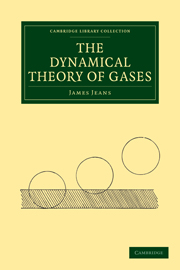Book contents
- Frontmatter
- PREFACE TO THE SECOND EDITION
- Contents
- CHAP I INTRODUCTORY CHAPTER
- MATHEMATICAL THEORY OF A GAS IN A STEADY STATE
- PHYSICAL PROPERTIES OF A GAS IN A STEADY STATE
- CHAP VI TEMPERATURE, PRESSURE, ETC.
- CHAP VII MASS MOTION, THERMODYNAMICS, CALORIMETRY AND DISSOCIATION
- MATHEMATICAL THEORY OF A GAS NOT IN A STEADY STATE
- PHYSICAL PHENOMENA OF A GAS NOT IN A STEADY STATE
- RADIATION AND THE QUANTUM THEORY
- APPENDICES
CHAP VII - MASS MOTION, THERMODYNAMICS, CALORIMETRY AND DISSOCIATION
Published online by Cambridge University Press: 05 July 2011
- Frontmatter
- PREFACE TO THE SECOND EDITION
- Contents
- CHAP I INTRODUCTORY CHAPTER
- MATHEMATICAL THEORY OF A GAS IN A STEADY STATE
- PHYSICAL PROPERTIES OF A GAS IN A STEADY STATE
- CHAP VI TEMPERATURE, PRESSURE, ETC.
- CHAP VII MASS MOTION, THERMODYNAMICS, CALORIMETRY AND DISSOCIATION
- MATHEMATICAL THEORY OF A GAS NOT IN A STEADY STATE
- PHYSICAL PHENOMENA OF A GAS NOT IN A STEADY STATE
- RADIATION AND THE QUANTUM THEORY
- APPENDICES
Summary
THE EQUATIONS OF MASS MOTION
209. In the last chapter some insight was obtained into the way in which pressure is exercised by a collection of moving molecules. We shall now attempt to carry further the study of the physical properties of a medium consisting of moving molecules, especially with reference to the similarities between the behaviour of such a medium and a continuous fluid.
We shall no longer consider only problems in which the gas is in a steady state, so that the law of distribution is Maxwell's law at every point. We shall consider problems in which the law of distribution of velocities is the general law f(u, v, w), and it will no longer be assumed that the law of distribution is the same at every point: we shall suppose the law of distribution to depend on x, y, z, as well as on u, v, w. When it is required to indicate this we shall write the law of distribution in the form f (u, v, w, x, y, z).
The number of molecules having their centres within the element of volume dxdydz surrounding the point x, y, z, and having their velocities within a range dudvdw surrounding the values u, v, w, will be vf (u, v, w, x y, z) dudvdwdxdydz(403).
In this expression vwill in general be a function of x, y, z, and will be evaluated at the same point as f. It is often convenient to think of the product vf as a single variable.
- Type
- Chapter
- Information
- The Dynamical Theory of Gases , pp. 165 - 205Publisher: Cambridge University PressPrint publication year: 2009First published in: 1904

